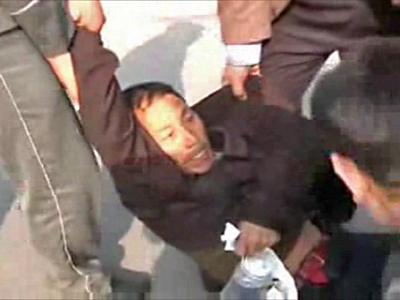
Farmer Released from “Black Jail”—Chinese Communist Party School

Detained in a school where he was watched 24 hours a day, a 63-year-old farmer from Guangdong Province, Li Shaoting was finally released on Monday.
The illegal detention was exposed by local media, the Nanfan Nonchun Paper last Saturday. Chinese authorities had detained Li at the Yangxi County Party School. These schools, operated by the ruling Communist Party, are meant to be training and education facilities for Party members.
The paper reported Li had been kept behind these heavily barred windows since March 26th. He was detained for petitioning in Beijing. Ten years ago, authorities accused Li’s son of violating the one child policy and burnt down his house. Since then, Li has been trying to petition for justice, but Chinese authorities have detained him every time.
Li is not the first person to be locked up at the school. According to the paper, there is a saying among locals that “the party school is not much different from a jail.”
This school is just one example of many illegal detention facilities, or “black jails” in China. Individuals, like long-time petitioners, are locked up by authorities whose performance appraisals partly depend on their ability to maintain so called “social stability.”
Aside from turning state-run schools into illegal jails, there are also increasing reports of the Chinese regime using psychiatric hospitals for persecuting people.
In October last year, rights group Civil Rights and Livelihood Watch began compiling a database of victims of psychiatric abuse. By February this year, more than 300 cases were reported. Victims are arbitrarily labeled as psychotic and are given drugs and so-called “treatment” against their will. According to the rights group, the majority of these victims were petitioners, political dissidents and members of the persecuted Falun Gong spiritual practice.
 Foto: NTDTV
Foto: NTDTV




























vielen Dank, dass Sie unseren Kommentar-Bereich nutzen.
Bitte verzichten Sie auf Unterstellungen, Schimpfworte, aggressive Formulierungen und Werbe-Links. Solche Kommentare werden wir nicht veröffentlichen. Dies umfasst ebenso abschweifende Kommentare, die keinen konkreten Bezug zum jeweiligen Artikel haben. Viele Kommentare waren bisher schon anregend und auf die Themen bezogen. Wir bitten Sie um eine Qualität, die den Artikeln entspricht, so haben wir alle etwas davon.
Da wir die Verantwortung für jeden veröffentlichten Kommentar tragen, geben wir Kommentare erst nach einer Prüfung frei. Je nach Aufkommen kann es deswegen zu zeitlichen Verzögerungen kommen.
Ihre Epoch Times - Redaktion